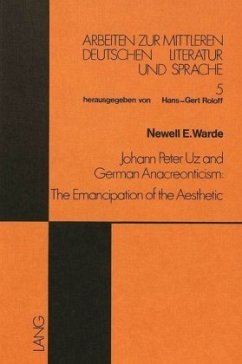From the very beginning of his career as a poet, Uz regarded his early Anacreontic works as a transitory phase, a preparation for the "higher" metaphysical ode that became his forte in the 1750's. He hoped the Anacreonticism of the 1740's would be the first bold step on the way to a radical renewal of the German lyric in the spirit of Baumgarten's aesthetic theory. This rehabilitated lyric was ultimately to reassert its traditional function as an aesthetic teacher in the service of human emancipation.
Bitte wählen Sie Ihr Anliegen aus.
Rechnungen
Retourenschein anfordern
Bestellstatus
Storno

